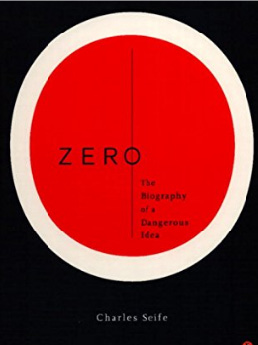Zero: The Biography of a Dangerous Idea
Charles Seife
Review by: Mary Catherine LaForest
With degrees in mathematics and journalism from Princeton, Yale and Columbia Universities; copious experience writing for academic journals, magazines, and documentaries; and a professorship in journalism at New York University, Charles Seife is as well-equipped as anyone to tie up tricky concepts in an appealing package. In his book, Zero: The Biography of a Dangerous Idea, Seife attempts to introduce cutting-edge, scientific knowledge to the average, North American physics and math enthusiast.
In his novel, Seife manages to weave accurate mathematical proofs into a human account of the origins and history of the number zero. In this tale, zero travels through time from east to west, from dualistic gods to Muslim conquerors, to Italian merchants to European monks, amongst Hindus, Muslims, Christians and Jews; all the while, searching for God from the infinite to the void.
From an educator’s perspective, this book is less useful than it is inspirational. It addresses a number of fascinating mathematical concepts including a plethora of number systems, lunar and solar calendars, the Golden Ratio, perspective drawing, vacuums, quantum mechanics, general relativity, space-time, black holes, String Theory, and the Big Bang. The story also makes abstract math equations accessible by covering geometry, algebra, and calculus from a developmental perspective. Beyond its obvious use in a high-school calculus class, this book builds connections between math, science, history, philosophy and the arts providing rich material for cross-curricular integration.
A major strength of this book was Seife’s ability to approach a dry topic from a dynamic perspective. I found the historical journey of the world’s adoption (and potential rejection!) of the number zero to be both interesting and eye opening. I gave this book a lower rating than I might otherwise have, as my analysis is in terms of its usefulness to educators. While I do think that it is important for elementary teachers to have a deep understanding of math concepts, I think that Zero proves a very challenging read and this fact, coupled with a potential lack of relevance to many elementary math programs, reduces it’s “bang for buck”.

